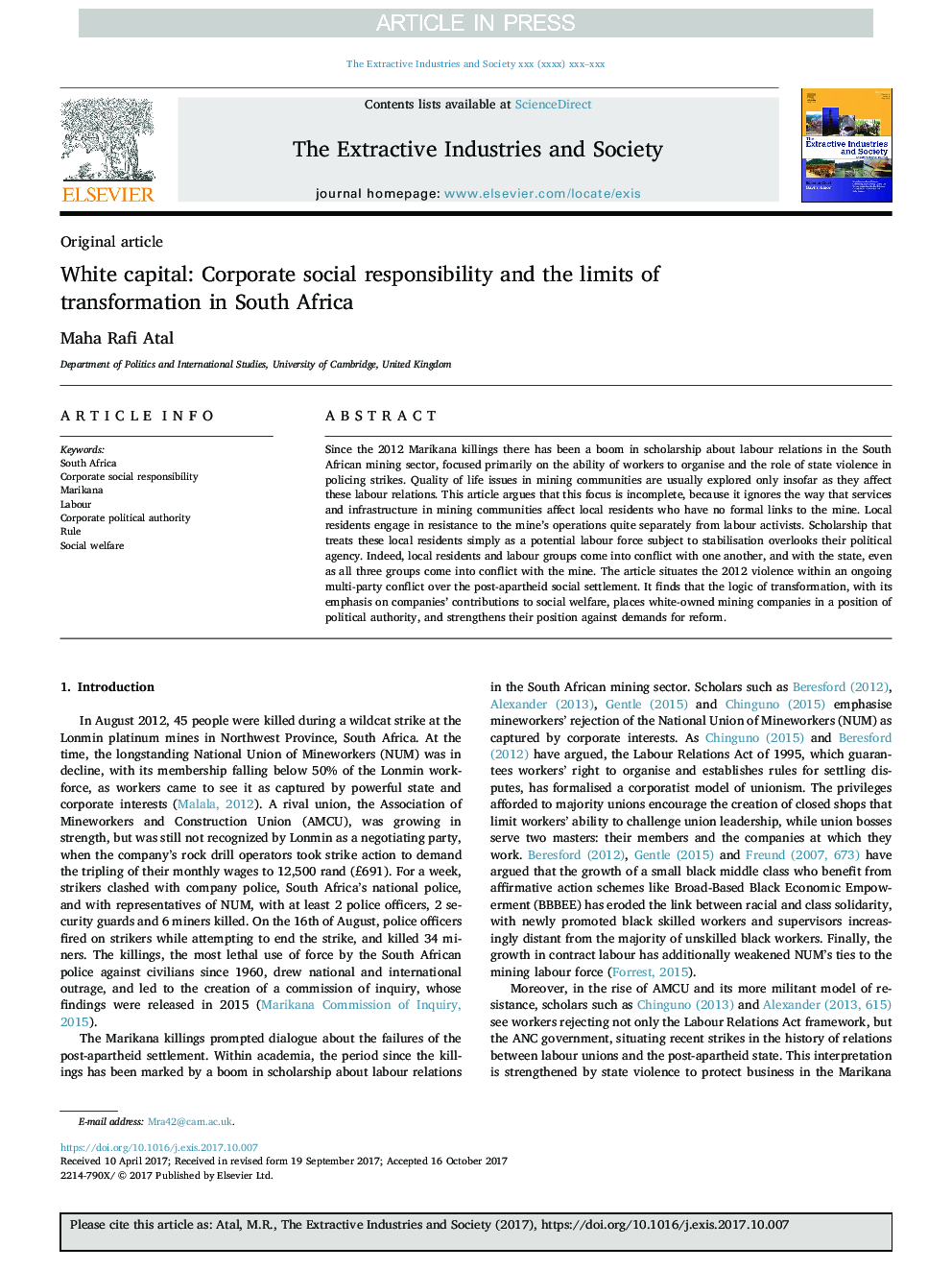| کد مقاله | کد نشریه | سال انتشار | مقاله انگلیسی | نسخه تمام متن |
|---|---|---|---|---|
| 7454302 | 1484418 | 2017 | 9 صفحه PDF | دانلود رایگان |
عنوان انگلیسی مقاله ISI
White capital: Corporate social responsibility and the limits of transformation in South Africa
ترجمه فارسی عنوان
سرمایه سفید: مسئولیت اجتماعی شرکت ها و محدودیت های تحول در آفریقای جنوبی
دانلود مقاله + سفارش ترجمه
دانلود مقاله ISI انگلیسی
رایگان برای ایرانیان
کلمات کلیدی
آفریقای جنوبی، مسئولیت اجتماعی شرکت، مارینکا، کار، اقتدار سیاسی شرکت، قانون، رفاه اجتماعی،
ترجمه چکیده
از زمان کشتارهای مارکانا در سال 2012، رونق بورس تحصیلی در رابطه با روابط کاری در بخش استخراج معادن آفریقای جنوبی، بیشتر به توانایی کارگران برای سازماندهی و نقش خشونت های دولتی در حملات پلیس رسیده است. مسائل مربوط به کیفیت زندگی در جوامع معدن معمولا بررسی می شود تا آنجا که بر این روابط کار تاثیر می گذارد. این مقاله استدلال می کند که این تمرکز ناقص است، چرا که آن را نادیده می گیرد که خدمات و زیرساخت ها در جوامع معدن بر ساکنان محلی تأثیر می گذارد که هیچ ارتباط رسمی با معدن ندارند. ساکنان محلی به طور جداگانه از فعالان کارگری مقاومت می کنند. بورس تحصیلی که این ساکنان محلی را به سادگی به عنوان یک نیروی کار بالقوه در معرض تثبیت قرار می دهد، به نمایندگی سیاسی آنها توجه می کند. در واقع، ساکنان محلی و گروه های کارگری با یکدیگر مخالفت می کنند و حتی با این که دولت ها همگی با معادن مواجه هستند. این مقاله خشونت 2012 را در یک درگیری چند حزبی در مورد حل و فصل اجتماعی پس از آپارتاید قرار می دهد. این می یابد که منطق تحول، با تاکید بر تأثیر شرکت ها در رفاه اجتماعی، شرکت های استخراج معدن سفید متعلق به مقامات سیاسی را تشکیل می دهد و موضع خود را نسبت به درخواست اصلاحات تقویت می کند.
موضوعات مرتبط
علوم زیستی و بیوفناوری
علوم محیط زیست
مدیریت، نظارت، سیاست و حقوق
چکیده انگلیسی
Since the 2012 Marikana killings there has been a boom in scholarship about labour relations in the South African mining sector, focused primarily on the ability of workers to organise and the role of state violence in policing strikes. Quality of life issues in mining communities are usually explored only insofar as they affect these labour relations. This article argues that this focus is incomplete, because it ignores the way that services and infrastructure in mining communities affect local residents who have no formal links to the mine. Local residents engage in resistance to the mine's operations quite separately from labour activists. Scholarship that treats these local residents simply as a potential labour force subject to stabilisation overlooks their political agency. Indeed, local residents and labour groups come into conflict with one another, and with the state, even as all three groups come into conflict with the mine. The article situates the 2012 violence within an ongoing multi-party conflict over the post-apartheid social settlement. It finds that the logic of transformation, with its emphasis on companies' contributions to social welfare, places white-owned mining companies in a position of political authority, and strengthens their position against demands for reform.
ناشر
Database: Elsevier - ScienceDirect (ساینس دایرکت)
Journal: The Extractive Industries and Society - Volume 4, Issue 4, November 2017, Pages 735-743
Journal: The Extractive Industries and Society - Volume 4, Issue 4, November 2017, Pages 735-743
نویسندگان
Maha Rafi Atal,
